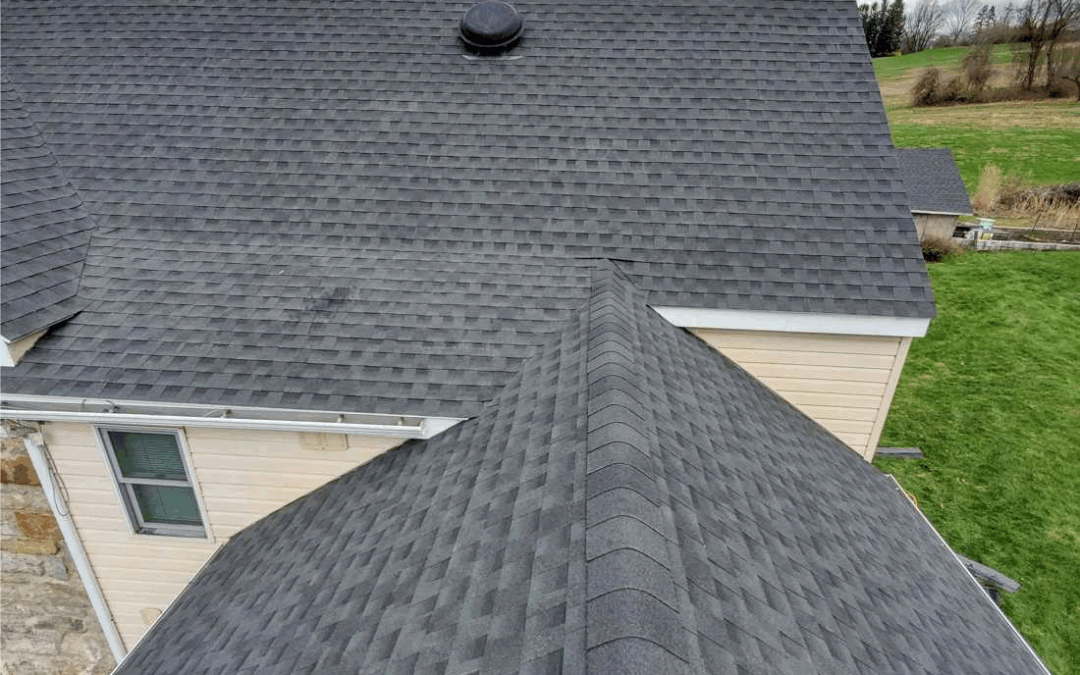Key Takeaways
- Roofing warranties vary widely by contractor and manufacturer. Always review the details before signing.
- A quality warranty may include roofing repair warranty, materials, and installation protection.
- The best roofing warranty combines strong coverage with clearly defined terms from a reputable contractor like Strenova Exteriors.
Investing in a new roof is a major decision for any homeowner in Greater Indianapolis. And while most people focus on materials and cost, there’s another element that deserves close attention: the warranty. Roofing warranties protect your investment, but only if you understand what you’re signing.
In this article, we’ll walk you through what these warranties actually cover, what’s considered a standard roofing warranty, and what to ask before signing off on your next roofing project in Greater Indianapolis.
What Does a Roofing Warranty Typically Cover?
When people ask, “What does a roof warranty cover?”, the answer depends on the type of warranty you’re getting. The two most common types are:
Manufacturer Warranties (Material)
Also known as roofing shingle warranties or metal roofing warranties, these are issued by the company that makes the roofing materials. They usually cover:
- Defects in shingles, metal panels, or synthetic tiles
- Failures due to normal weather conditions
- Manufacturing defects that cause premature deterioration
However, they won’t cover improper installation, which is why a second warranty type matters.
Contractor Workmanship Warranties
This is your roofing contractor warranty, and it protects you from issues caused by poor installation, shortcuts, or errors made during your roof repair or replacement.
Some companies also offer a roofing repair warranty specifically for patch jobs or partial roof work, which is worth asking about if you’re not replacing the entire roof. Get in touch with the Strenova team if you’re thinking about roofing services for your Greater-Indianapolis home; we’ll give you all the details about our warranties.
Types of Roofing Warranties You’ll Encounter
Here’s a brief guide to roofing materials and how their warranties typically break down:
- Asphalt shingles: Covered under most roofing shingle warranties, typically ranging from 20–30 years depending on the brand and installation quality.
- Metal roofing: Backed by long-term metal roofing warranties, sometimes up to 50 years, often with additional finish protection for fading or corrosion.
- Composite or synthetic roofs: Often come with an upgraded new roof warranty when installed by certified contractors, extending both material and labor coverage.
- Labor warranties: These may be listed as a roofing repair warranty, roofing contractor warranty, or roofing installation warranty. They typically range from 1–10 years and cover workmanship on either full replacements or smaller repair projects.
Don’t assume your new roof warranty automatically covers both materials and labor. This is why it’s important to understand what a roof warranty does and does not cover before you sign.
How Long Do Average Roofing Warranties Last?
What is the average warranty for a new roof? Here’s a general breakdown:
- Material-only warranties: 20–50 years, depending on product quality and brand
- Labor warranties: Often connected to a roofing repair warranty or replacement job, typically 1–10 years, depending on the contractor
- Enhanced system warranties: In premium packages, these may extend to 50 years when all components come from the same manufacturer and installation meets their specifications
In this case, the key is understanding what a roof warranty does cover, specifically in terms of material defects, workmanship issues, and potential exclusions.
Are Roofing Warranties Transferable?
Many manufacturer and roofing contractor warranty programs allow a one-time transfer to a new homeowner, but not all do. This applies whether it’s a roofing repair warranty from a small patch job or a roof replacement warranty for a full install.
Before you assume coverage will carry over, confirm the transfer terms and whether any roof warranty coverage changes once the property changes hands.
How Much Does a Roofing Warranty Cost?
Most roof warranty costs are bundled into the project, but extended or enhanced roofing warranties, whether it’s a roofing repair warranty for a partial job or an upgraded manufacturer plan, may carry a fee. These upgraded warranties can:
- Add labor coverage beyond the standard roofing warranty
- Expand what a roof warranty covers to include system-wide protection
- Offer longer non-prorated terms for materials and workmanship
Red Flags to Watch for in Roofing Warranties
- Loopholes that shrink roofing repair warranty protections after a few years
- Misleading “lifetime” claims that aren’t clear about what’s covered after prorating kicks in
- Non-transferable terms, especially if resale is in your plans
- Unlicensed contractors, whose roofing company warranty may not be enforceable
Choose a contractor who explains the warranty in plain language and gives you written documentation.
How to Choose the Best Roofing Warranty (and Contractor)
Here are some key questions to ask before signing any roofing agreement:
- What type of warranty is included with this job? A roofing repair warranty for a partial fix, a full roof replacement warranty, or both?
- Is it from the manufacturer, the contractor, or both?
- How long does it last, and exactly what does a roof warranty cover in this case (materials, labor, or system components)?
- Are there any conditions that could void the warranty, such as skipped maintenance or unapproved repairs?
- Is the warranty transferable if I sell my home, and will coverage remain the same for the next owner?
Strenova Exteriors provides highly detailed free estimates so you know exactly what’s included, from the materials we use to the roofing contractor warranty or roofing repair warranty that applies to your project. Our approach is built on clear communication, excellent project management, and quality workmanship you can trust.
Contact us today to request a free roofing consultation tailored to your needs.
FAQ: Roofing Warranties
What does a roof warranty cover?
Coverage varies but often includes materials, such as shingles under roofing shingle warranties or panels under metal roofing warranties, and sometimes installation or labor under a roofing contractor warranty. A strong warranty will protect against manufacturing defects, premature wear, and, if included, workmanship errors from the contractor.
What is the average warranty for a new roof?
The average roofing warranties for materials last 20–30 years for asphalt shingles and up to 50 years for premium products like metal. Labor warranties, including those tied to a roofing repair warranty, typically last between 1–10 years. Always check whether your warranty is prorated or non-prorated, as this impacts long-term value.
Are roof warranties worth it?
Yes! Comprehensive roofing warranties are worth it, especially if they include both materials and workmanship coverage. A well-structured warranty can save thousands in unexpected repairs, whether it’s for a full replacement or a targeted roofing repair warranty following storm damage.
Do roofing companies offer warranties?
Reputable companies like Strenova Exteriors offer workmanship warranties in addition to manufacturer warranties. This means you get protection for both the materials used and the quality of the installation. If you’re getting a repair rather than a full replacement, ask whether a roofing repair warranty is included.
Are roofing warranties transferable?
Often, yes. Many manufacturer warranties allow a one-time transfer to a new homeowner within a set time frame, which can boost resale value. If your home has recently had work done, confirm whether the roofing repair warranty or full replacement warranty will transfer and whether roof warranty coverage changes after the transfer.
What’s the best roofing warranty available?
The best roofing warranty offers long-term, non-prorated protection for both materials and labor, includes clear details on coverage, and is backed by a certified, reputable contractor. Look for warranties that include transferability and no hidden clauses that could void coverage.

